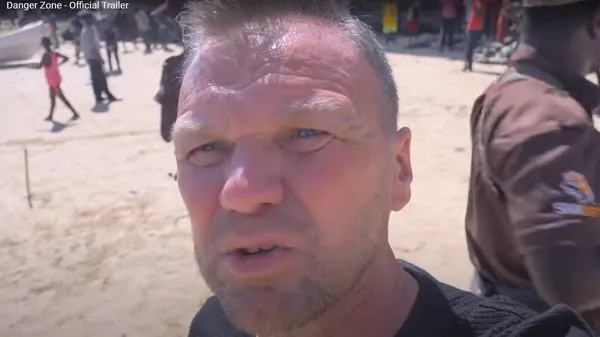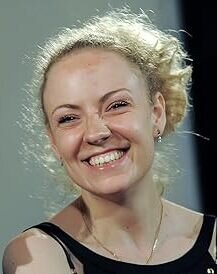 |
| Andrew Drury in Danger Zone. 'It's difficult because it seems you're kind of filming people's misery. Which we're not. I didn't feel we were' Photo: Courtesy of Dogwoof |
In Danger Zone, Lithuanian-born Vita Drygas explores the world of war tourism. Global conflict in countries including Somalia and Afghanistan, is seen through the eyes of willing thrill-seekers and people who are on a dangerous personal journey. Englishman Andrew Drury is an experienced war tourist and a key character in this exploration of unusual curiosity and shocking conflict. He plays an important part in a documentary which acts as a continuation of the Polish director’s inquiry into warfare, after her Ukraine-focused film, Piano (2015) made at the height of the Maidan Square protests.
At Warsaw Film Festival, Drury and Drygas talked abut war tourism, how the film affected Drury's family life and the challenges of a documentary crew when making a film alongside civilians in warzones.
How did you both discover war tourism and why did you decide to make a documentary about it?
Vita Drygas: It started with my previous movie, Piano, which was made during Maidan in 2014. I was emotionally involved with the movement in Ukraine. I think that at that moment, I was more involved with the revolution than with filmmaking.
Andrew Drury: In the beginning, there were just a bunch of holidays. At first, I did not look for tourist agencies, but they’re out there, as you see in the film. Vita asked me to be in the movie. I was saying no, but not because I did not want to expose myself, as most people knew about me. But eventually, she convinced me.
Trust is important in making a documentary. How did you manage this aspect? And how did both of you work on expanding the dynamics of your relationship? Was there a tipping point?
AD: At that time it didn't feel like I was quite enjoying my life. But conversations with Vita made me want to do these sorts of things. And conversations with her felt like therapy. You know, I found out through the movie, why I did it. I had quite a difficult life when I was young, my brother died when he was ten years old. He was a year younger than me. So I always felt I needed to achieve something through my brother. And in our conversations, I was able to open up to her and the trust got formed. So I trusted her like a family member. And it's difficult for the director because our relationship is director and whatever I am, but the trust came. And because of that, I felt I could tell her things that generally you'd only tell your family.
Andrew, how did you discuss the entire filming process with your family? Vita became a voyeur of your personal life. There are a lot of close-ups indicating your wife's or your son's distress.
AD: It's very selfish as a person to leave your children at home, knowing that you might not come back. So it's difficult to say goodbye to your children, but equally, it's also hard to say goodbye to the children that I met when I was away.
I mean, if not for that experience I wouldn't be here now. If I didn't go there, I wouldn't have been able to help the hundreds of people I've helped during the time I've travelled. So it's a lot deeper than just saying goodbye to your children. And that image sticks with you because I'm sure in your mind you’re like, ”What a selfish man. He's got a lovely family, he's got everything. Why would he do that?” Sometimes in life, we do things because we need to do them. There isn't a reason. You need something for your heart and soul.
VD: And when Andrew saw the movie, he told me, “Oh, my goodness, Vita, I was so irresponsible”. And for me, as a director, when you see that your character is changing, it's a lot.
What kind of methods did you work with? Because being in a warzone with a camera and a film crew creates a real danger, which requires responsibility.
VD: So in each warzone, you need to have a very, very small camera, but of course, of high quality. And I remember at the beginning I met with a cinematographer with whom we had to work but because of Covid, everything was delayed, and we had a lot of cinematographers. We decided to use very small equipment because you need to be low-key. And what is extremely important, everywhere in warzones, is not to draw attention.
How did the different warzones impact the filmmaking process and both of your approaches?
AD: It's very difficult because you also don't want to disturb people's lives. We go into a village or into an area, and we come with a camera crew. It's difficult because it seems you're kind of filming people's misery. Which we're not. I didn't feel we were.
How are you still connected to the spaces and people you visited?
VD: We want to create a charity. When you see the refugee camp with children in the film. The Turks cut their water to that camp. So the main and the most important thing about this movie is to create a charity, which is difficult. But it is worth it. Because making the movie only for the movie is not the point.
AD: I'll actually tell you a story, which changed why and how I travel. When I went to Kirkuk, Iraq, there was a war with ISIS. I was excited to have an opportunity to go to the frontline. It was an active frontline. We got lost but we found a film crew reporting on the war. We came under attack. And during that period of time, there's one thing I'll tell you, and it's a very emotional story. There was a big hole in the ground with a sniper. His sights were set on a house for like two hours. I asked the guy: “Why did you not move at all?” And he told me: “That is my house and I’m watching over my family from here”.
So it's not just tourism. I go back and visit these people off-camera. And I give as much as I can give. This is too big of a project. So my friends are everywhere. We’re not making the film and then we leave. I made the film for my friends. For life.
























